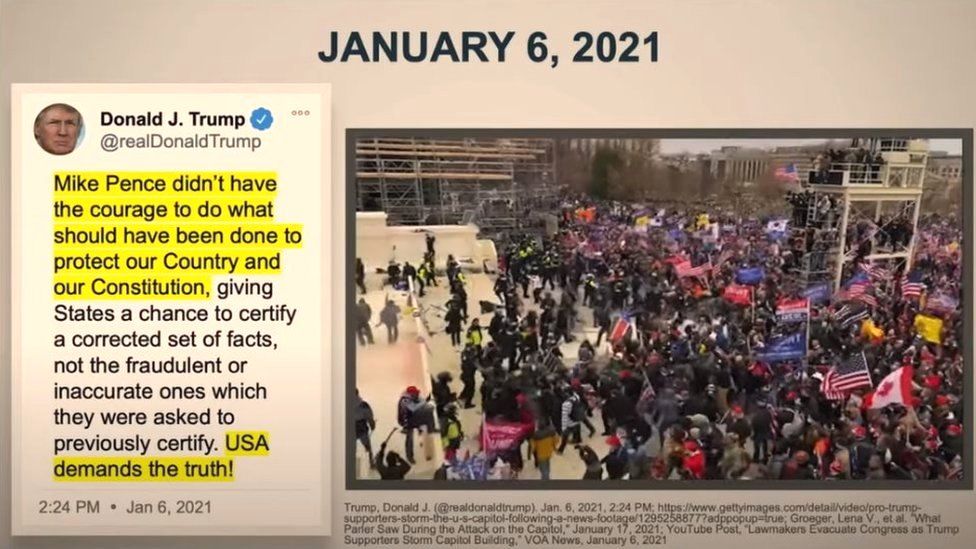Trump impeachment: Graphic video shown as ex-president called 'inciter in chief'
Senators at Donald Trump's second impeachment trial have been shown new dramatic and graphic video of the day his supporters stormed the US Congress.
The footage showed police engaging in hand-to-hand clashes with rioters and desperately pleading for support.
Officers ushered politicians to safety, sometimes within metres of the mob breaking into the chambers.
Using Mr Trump's own words and tweets, Democrats prosecuting the case argued he had acted as "inciter in chief".
A two-thirds majority is required to convict Mr Trump in the evenly split 100-seat Senate, but an acquittal looks likely as the vast majority of Republican senators have remained loyal to him so far.
However, if convicted, he could be barred from holding office again.
In at times emotional testimony, impeachment managers - the Democrats tasked with leading the prosecution - methodically pieced together the 6 January attack on the Capitol.
The building was stormed after thousands gathered in support of false claims that widespread fraud denied Mr Trump victory in the November presidential election. Five people died, including a Capitol police officer.
What did the video show?
The previously unreleased security footage revealed how rioters, including some in body armour, violently breached the building and sought out those who had gathered to certify the election result.
In frenzied audio, security officials were heard describing how crowds were using weapons like bats and tear gas against them.
In one clip, Republican senator and former presidential candidate Mitt Romney was seen walking towards the rioters before being ushered to safety by Capitol Police Officer Eugene Goodman.
Another video showed Vice-President Mike Pence and his family being evacuated amid chants by some in the crowd to "hang" him for refusing to object to certifying the result.
In another sequence, staffers of House Speaker Nancy Pelosi were heard whispering in hiding as rioters breached her office and called out: "Where are you, Nancy".
Graphic mobile phone footage showed a Trump supporter being shot dead as she tried to enter the House of Representatives' lobby and another video showed a riot police officer screaming out in pain as he was crushed in a doorway by the mob.
How did the Democrats present their case?
Senators sat through the first day of evidence in which each side has 16 hours to present their case. Lead prosecution manager Jamie Raskin argued Mr Trump was no "innocent bystander" to the violence having "praised, encouraged and cultivated" it for months.
Delegate Stacey Plaskett, presenting evidence, argued that the former president had "deliberately encouraged" the violence and "put a target on the backs" of senior figures, including his own vice-president.
Impeachment managers used social media posts and clips of Mr Trump to illustrate how he spent weeks pushing a "big lie" that the election had been stolen from him, and with his reaction to the attack.
They forensically dissected footage of the speech the former president gave just hours before the attack, in which he told the crowd to "fight like hell". The managers said Mr Trump used the rally to "inflame" supporters further before directing them to march to the Capitol.
Screenshots from pro-Trump websites were shown as evidence that radicals in his support base were emboldened by his rhetoric to pre-plan the attack and spoke openly about their ambitions for violence against lawmakers.

Those arguing the case repeatedly appealed to the emotions of senators, who act as jurors in the case, about their own experiences on the day. "You were just 58 steps away from where the mob was amassing," Congressman Eric Swalwell told them.
"These attackers stood right where you are... They desecrated this place and literally the president sat delighted, doing nothing to help us," Representative David Cicilline said, telling Republicans: "We have to make this right, and you can make it right."
Impeachment managers also focused on Mr Trump's failure to condemn and call-off his supporters as the violence unfolded. "President Trump left everyone in this Capitol for dead," Representative Joaquin Castro said.
Despite the strong footage, several Republican senators said they had not changed their minds. "[Mr Trump] bears some responsibility for what happened that day, but... that doesn't mean that impeachment is the right way to address it," said Senator Marco Rubio.

Impeachment: The basics
- What is impeachment? Impeachment is when a sitting president is charged with crimes. In this case, former President Trump is accused of having incited insurrection
- What has already happened? The House of Representatives voted to impeach Mr Trump for a second time on 13 January, a week before the end of his term. The Senate is now holding a trial
- So what does it mean? As he is no longer president senators can vote to bar him from holding public office again - but only if he is convicted

What will happen next?
Democrats will continue to argue their case for conviction on Thursday, before Mr Trump's team take to the stand in his defence. They have already argued the trial is politically motivated and unconstitutional and that he did not encourage violence.
Arguments are expected to run through until the weekend when senators will get a chance to ask questions.
It is unclear if the impeachment managers will then extend the timetable by requesting witnesses be called or ordered to testify - or subpoenaed. Mr Trump has already declined to voluntarily testify.
Lawmakers on both sides are said to favour a quick trial and a Senate vote on whether to acquit or convict Mr Trump could be held early next week.
Only six Republicans voted that the trial was constitutional earlier this week, far short of the 17 that would be required to vote with Democrats to achieve a conviction in the final vote.



No comments